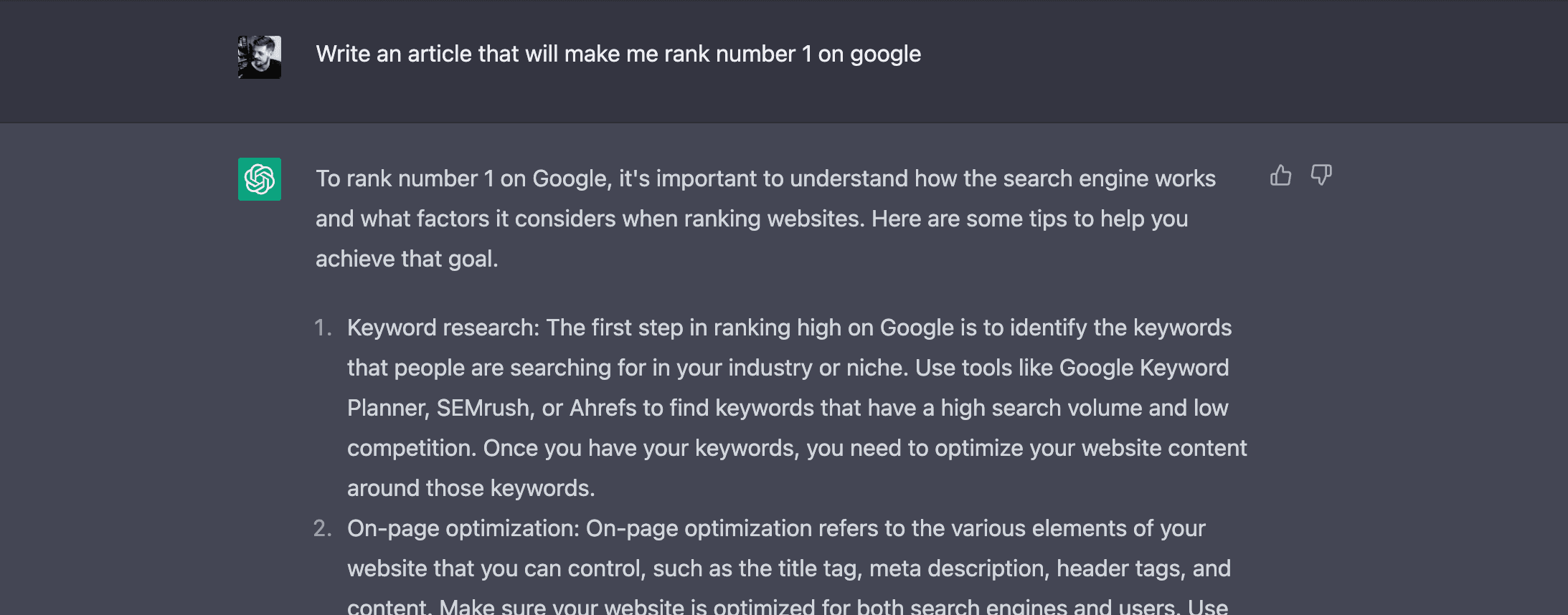Is using AI generated content safe for SEO?
Artificial intelligence (AI) has become an increasingly popular tool for digital marketing professionals, particularly in the area of search engine optimisation (SEO) and content writing. It seems everywhere you turn everyone is talking, Reeling and TikToking about Artificial Intelligence. AI for content writing, AI for image generation, AI for video creation. However, there are both benefits and risks associated with using AI for SEO and content writing. This post explores the potential of generative AI in content creation and the precautions content creators should take to ensure they are using AI safely and effectively.

The Potential and Risks of AI for Content Writing
AI-powered tools like ChatGPT, Jasper and WriteSonic have shown great potential in speeding up content writing and idea creation, offering digital marketing professionals a valuable resource to potentially produce high-quality content.
Despite the potential benefits, AI-generated content comes with its own set of risks. Generative AI is reliant on the dataset it was trained on and sometimes "hallucinates" the answers. This highlights the importance of human intervention, oversight, and fact-checking to ensure the accuracy of AI-generated content.
AI Hallucination Problem
AI hallucination refers to confident responses generated by artificial intelligence systems that aren't justified by their training data. I.E. It just makes things up to fill in the missing information. This is a massive problem for content writers and ultimately can lead to poor-quality content.
Some researchers attribute hallucinations to insufficient training data, while others argue that they may result from errors in encoding, decoding, or training processes. Hallucinations can manifest in various ways, such as generating false information, and have been identified as a major issue in AI technology, prompting efforts to reduce their occurrence.
The Importance of Subject Matter Expertise
While AI-powered tools can help with content creation, they are not a substitute for human subject matter experts. Professionals with in-depth knowledge of their field can provide insights, new ideas, analysis, and perspective that AI tools cannot replicate. AI will only ever be as good as the information and the quality of the information. In the world of digital marketing, subject matter expertise is crucial for creating high-quality, valuable content that resonates with the target audience and complies with search engine guidelines.
AI's Ability to Browse the Web, is it a Game Changer?
OpenAI recently introduced plugins for ChatGPT, including a web-browsing plugin that allows the AI to access third-party knowledge sources and databases on the internet. This capability extends the AI's functionality beyond its initial training dataset, potentially addressing the issue of outdated or limited knowledge in AI-generated content.
The web-browsing plugin retrieves content from the web using the Bing search API, providing cited sources in ChatGPT's responses. This new feature comes with its own set of risks, as experimental systems like WebGPT have been known to quote unreliable sources or cherry-pick data. OpenAI acknowledges these concerns but has implemented several safeguards to prevent abuse.
With the ability to browse the web, ChatGPT could potentially become a more reliable and up-to-date content generator for content writers once it's released on a larger scale. However, it is crucial to continue emphasising the importance of human expertise, oversight, and fact-checking to ensure the quality of AI-generated content.
What Does Google Say About AI Generated Content?
Does Google penalise AI generated content? The short answer for now is no and also potentially yes.
In a recent update, Google shared its perspective on AI-generated content and its role in search results. Google's ranking systems aim to reward original, high-quality content that demonstrates expertise, experience, authoritativeness, and trustworthiness (E-E-A-T). According to Google, the focus should be on the quality of content, rather than how content is produced. I.E. if you use generative AI to help you produce the content, as long as that content is factual, informative and high quality the writing method does not matter.
Google acknowledges that automation, including AI, can be used to generate helpful content, however, using automation with the primary purpose of manipulating ranking in search results is a violation of Google's spam policies. Google has systems, such as SpamBrain, in place to combat spam content, regardless of how it is produced.
Conclusion
AI-generated content has the potential to revolutionise the world of digital marketing and SEO, but it also comes with inherent risks. As AI tools like ChatGPT continue to evolve, their ability to browse the web could help address some of the limitations associated with the data they were trained on, thus reducing the issue of hallucination and improving content quality. In the following articles in this series, we will dive deeper into the best practices for safely using generative AI in content writing and how to adhere to Google's policies while leveraging the power of AI-generated content. Stay tuned for more insights on harnessing the power of AI while minimising the risks.
Sign up for our newsletter for more insights like this
We promise not to spam your inbox. We send a newsletter once a month or when we have something important to say that just can't wait.